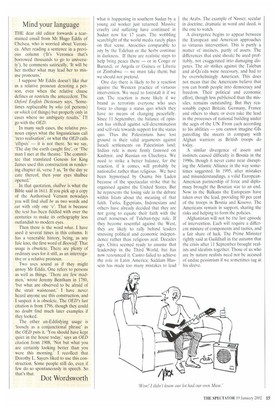Mind your language
THE dear old editor forwards a tearstained email from Mr Hugo Eddis of Chelsea, who is worried about Veronica. After reading a sentence in a previous column (It's Veronica that's borrowed thousands to go to university'), he comments satirically, 'It will be her mother what may lead her to misuse pronouns.'
I suppose Mr Edclis doesn't like that as a relative pronoun denoting a person, even when the relative clause defines or restricts the antecedent. The Oxford English Dictionary says, 'Sometimes replaceable by who (of persons) or which (of things) but properly only in cases where no ambiguity results.'
go with the OED.
In many such cases, the relative pronoun enjoys what the linguisticians call 'zero realisation', or what the OED calls 'ellipsis' — it is not there. So we say, 'The day the earth caught fire', or 'The man I met at the theatre.' The committee that translated Genesis for King James used this construction in rendering chapter iii, verse 5 as, 'In the day ye eate thereof, then your eyes shalbee opened.'
In that quotation, shalbee is what the Bible said in 1611. If you pick up a copy of the Authorised Version nowadays you will find shall be as two words and eat with only one `e'. That is because the text has been fiddled with over the centuries to make its orthography less outlandish to modern eyes.
Then there is the word what. I have used it several times in this column. It has a venerable history, being, as any lute kilo, the first word of Beowulf. That usage is obsolete. There are plenty of ordinary uses for it still, as an interrogative or a relative pronoun.
Two uses sound as if they might annoy Mr Ecldis. One refers to persons as well as things. 'There are few madmen,' wrote Jeremy Bentham in 1780, 'but what are observed to be afraid of the strait waistcoast.' I have never heard anyone use this construction, and I suspect it is obsolete. The OED's last citation is from 1796, though they could no doubt find much later examples if they looked.
The other un-Eddisfying usage is 'loosely as a conjunctional phrase' as the OED puts it. 'You should have kept quiet in the house today,' says an OED citation from 1908, 'Not but what you are certainly looking better than you were this morning.' I recollect that Dorothy L. Sayers liked to use this construction. Some people still do, even if few do so spontaneously in speech. So that's that.
Dot Wordsworth






























































 Previous page
Previous page